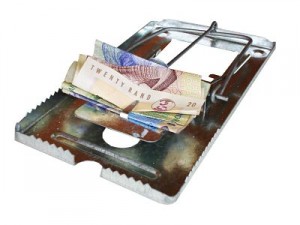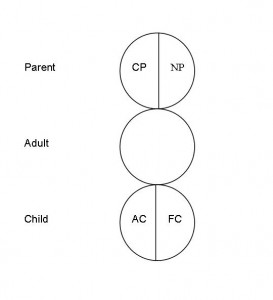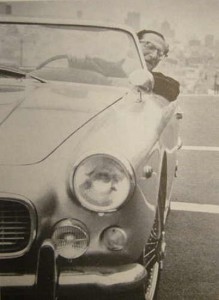 Part one of this post introduced the idea of ego states. I’m going to look at my super strong desire for iPhone 4s and iPads from an ego state perspective.
Part one of this post introduced the idea of ego states. I’m going to look at my super strong desire for iPhone 4s and iPads from an ego state perspective.
My Free Child ego state really wants to buy buy buy! My Controlling Parent is saying in no uncertain terms that I am not allowed to splash the cash down the local Apple store because I can’t afford it. My Adapted Child follows the instructions of the Controlling Parent and a conflict is set up. This is a similar thing to what happens when we go on diets. Carole Rayburn wrote an article in the TAJ explaining the whole sequence – I’m going to paraphrase below:
Our Controlling Parent tells us that we are too fat and we need to cut down on the cakes, sweets, chocolate and other foods that we love to eat and are bad for us. Our Adapted Child complies but is not very happy about it. We put up with this for a certain amount of time or until we reach a target weight. Once we get there things shift. Often the Rebellious Child clicks in and we go back to our pies, chocolate or crisps. Before we know it we are back to our original weight and feel sad that we have failed, yet again to “Control” ourselves.
Carole suggests that the answer is to stop being so hard on ourselves and nurture instead. Our Nurturing Parent needs to team up with our Child and give permission for the Adult – the sensible part of ourselves, to regulate our weight. Our Child needs to be soothed by our Nurturing Parent and believe that they are not going to be deprived and that there is enough food to go round. Then slowly that need to shovel food into our faces as if it’s the last ever time we will be able to have them will subside. I’m not pretending that this is easy to do. Research by Lister, Rosen and Wright (1985) examining a group of women using this method to lose weight showed that in the initial stages most put weight on. It takes time for that Child part of ourselves to feel safe enough to take this new approach. This is one possible approach I would take when providing therapy to a client with these sort of issues.
In part 3 of this post, I look at an Acceptance and Commitment Therapy method for managing our urges, called Urge surfing.
Read part one of this blog post here.
References:
Lister, M. Rosen, K. and Wright, A. (1985) ‘An Anti-diet Approach to Weight Loss in a Group Setting’. Transactional Analysis Journal 15, 69-72.
Rayburn, C.A. (1978) ‘On the Importance of Self Stroking in Weight Control’. Transactional Analysis Journal 8, No 3 227-228.
Buy the Book: Transactional Analysis: 100 Key Points and Techniques


 If we go back to the scenario we were facing in the
If we go back to the scenario we were facing in the  This all may sound like a long and drawn out process but let’s face it, we think quickly. All of this can rush through our minds in a few seconds. Another thing to understand is that we have lots of urges during a day and many of them are no problem at all. Have the urge to eat a Jammy Dodger? Go eat a Jammy Dodger, it’s not really going to impact on our lives (unless we are allergic to jam!) Have an urge to eat a packet of Jammy Dodgers? Now, that might be a problem if our values are to stay healthy and maintain a sensible weight and diet so get your metaphorical wet suit on ready for action!
This all may sound like a long and drawn out process but let’s face it, we think quickly. All of this can rush through our minds in a few seconds. Another thing to understand is that we have lots of urges during a day and many of them are no problem at all. Have the urge to eat a Jammy Dodger? Go eat a Jammy Dodger, it’s not really going to impact on our lives (unless we are allergic to jam!) Have an urge to eat a packet of Jammy Dodgers? Now, that might be a problem if our values are to stay healthy and maintain a sensible weight and diet so get your metaphorical wet suit on ready for action!